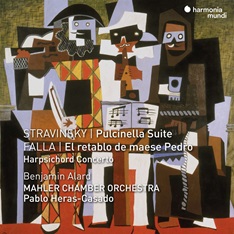Die kleine Kammeroper El Retablo de Maese Pedro verwendet eine Episode aus dem Don Quijote von Cervantes und zeichnet sich durch eine sehr ungewöhnliche Instrumentierung aus. Das nutzt Pablo Heras-Casado für eine ebenso farbige wie einfühlsame Interpretation. Gute Sänger die ihren Rollen gerecht werden heben diese Aufnahme aus dem Katalogangebot eraus.
Es folgt das selten gespielte Konzert für Cembalo und fünf Instrumente von Manuel de Falla, das dieser in den Jahren 1923-1926 komponierte. Die Musik hat Wurzeln im Barock und ist letztlich doch neoklassisch, aber von den Farben und Motive her unverkennbar de Falla.
Ein ausdrucksvoller, kantabler langsamer Satz wird von zwei vitalen und energischen Ecksätzen gerahmt. Diese drei Sätze werden sehr spannend und rhetorisch dargeboten.
Die Interpretation der Suite aus dem Pulcinella-Ballett von Stravinsky
ist nicht hochglanzpoliert. Sie wird virtuos und schwungvoll gespielt, aber Heras-Casado hütet sich davor, Ironie und Witz zu stark zu betonen, so dass alles in einem geschmackvollen Rahmen bleibt.
Letztlich bleibt aber über das ganze Programm hinweg das Gefühl, dass mehr Sorgfalt als Esprit und Inspiration vorherrscht.
The small chamber opera El Retablo de Maese Pedro is based on an episode from Cervantes’ Don Quixote and features an unusual instrumentation. Pablo Heras-Casado uses it for an interpretation that is as colorful as it is sensitive. Good singers who do justice to their roles make this recording stand out in the catalog.
Next is the rarely performed Concerto for Harpsichord and Five Instruments by Manuel de Falla, composed between 1923 and 1926. The music has baroque roots and is ultimately neoclassical, but the colors and motifs are unmistakably de Falla.
An expressive, cantabile slow movement is framed by two vital and energetic outer movements. These three movements are presented in a very exciting and rhetorical manner.
The interpretation of the suite from Stravinsky’s ballet Pulcinella
is not just polished. It is played with virtuosity and verve, but Heras-Casado is careful not to overemphasize irony and wit, so that everything remains within a tasteful framework.
Ultimately, however, there is a sense throughout the program that more care than esprit and inspiration prevails.


















